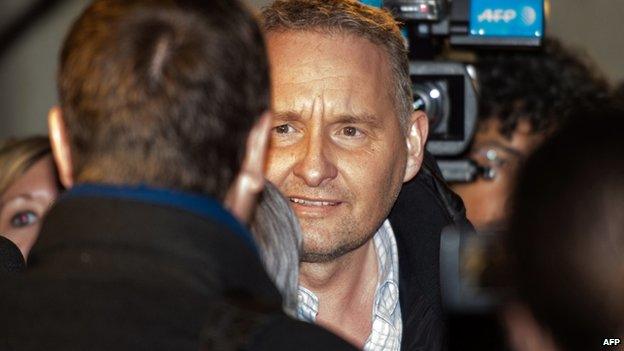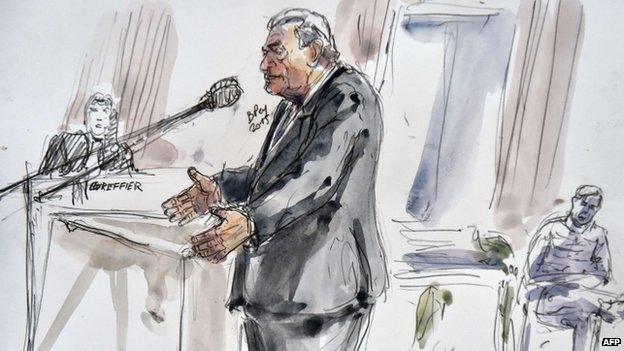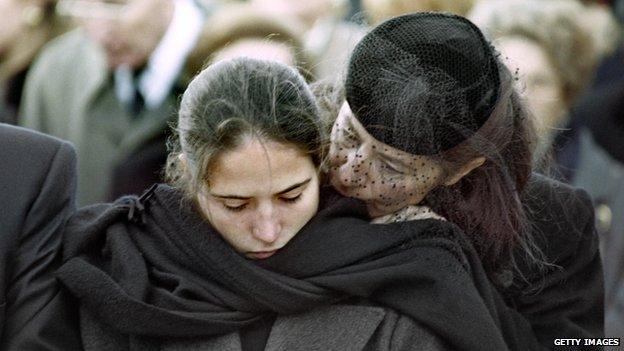Has the DSK trial changed French attitudes to sex?
- Published

Mr Strauss-Kahn admitted he was a libertine, but said he was "horrified" by the use of prostitutes
Have French attitudes to privacy and the sex lives of their politicians changed in light of "l'affaire DSK"?
On Friday, a judge in Lille acquitted Dominique Strauss-Kahn of the charge of aggravated pimping.
The 66-year-old former head of the IMF had denied claims he procured prostitutes to attend sex parties in France, Belgium and the US.
The man once tipped as a future president of France admitted being a swinger who enjoys group sex and said he attended about four "soirees libertines" a year.
Prostitutes described rough sexual behaviour; he retorted that he wasn't on trial for "deviant practices".

Co-defendant Fabrice Paszkowski said he organised sex parties but denied that DSK knew the women were paid
Mr Strauss-Khan's lawyers, one of whom quoted Camus and the 1789 Declaration of the Rights of Man in his closing speech, argued the trial was an invasion of their client's right to a private life and that he had no knowledge that some of the women he slept with at these pre-arranged sex parties were prostitutes.
Towards the end of the trial, the main prosecutor appeared to accept these arguments.
Dominique Strauss-Khan's sexual proclivities first made headlines in 2011 when he was arrested in America, accused of the attempted rape of a hotel maid. The charges were dropped and he settled in a civil case.
'Not judicially punishable'
Didier Specq, a retired legal correspondent who has written a book about the Lille trial, told me French attitudes to DSK have shifted since then.
"We were shocked in 2011 when the story came out, when he was a presidential candidate and considered the future president.

Prosecutor Frederic Fevre admitted the evidence heard in court had not established DSK's guilt
"But in court, in 2015, he is no longer a politician. And he gave the impression of compassion, he was self-critical, he said 'yes, maybe I can be a bit brutal with women,' and he apologised and was respectful.
"In three weeks, he changed his image and almost appeared like a victim. He started off looking like a predator, but in the end opinion turned on its head with the realisation that nothing extraordinary happened.
"Maybe it was contemptible from a moral point of view - you wouldn't want your daughter or sister involved - but it wasn't judicially punishable."
'Undue entitlement'
Unlike in the UK, a politician's right to privacy has always been sacrosanct in France. Mistresses are tolerated and President Mitterrand even had an illegitimate daughter without it being reported.

President Mitterrand's illegitimate daughter Mazarine Pingeot was kept secret for years
But the renowned French feminist Christine Delphy, who co-founded a publication with Simone de Beauvoir, questions who has benefitted from this status quo.
"The French are very fond of using their own history to back up their claims to impunity. They say everyone has their morals and private life is a separate domain.
"But the right to privacy, who has it? It's men who want to do whatever they want in their homes or in a hotel room. It's a defence of undue entitlement but they don't see it as undue."
'Seduction a la francaise'
Last month, 40 female French journalists wrote an open letter, external detailing some of the sexism they've experienced at the hands of French politicians.
The claims included a minister on a factory visit suggesting it would be better if the female journalists in mandatory blue overalls "had nothing on underneath", and an MP telling a reporter standing in the Assemble Nationale: "So you're streetwalking now, you're waiting for a client."
Lenaig Bredoux from Mediapart was one of the letter's signatories.
"In France, maybe you have quite a tolerance to sexism because men say it's "seduction a la francaise"; it belongs to our culture. And in politics, it's not just two, three, five politicians who are sexist, it really is something we see all the time.
"In the end, some women start thinking maybe it's normal. You become fatalist thinking that it's the way it is in France, you have to get used to that.
"One of the goals of the open letter is to say, 'it's enough, we don't want that anymore'."
As for DSK, she says his arrest in 2011 had a huge impact on France, and not just because he didn't become president.
It also sparked debates about what the press knew about his sex life and kept hidden, and questions about what counts as private life, or sexual harassment.
"It's the first time we had these debates," she says, "but this fight is not over".
You can watch Katie Razzall's full report on Newsnight on BBC Two on Thursday 11 June at 10:35 BST or afterwards on the BBC iPlayer.